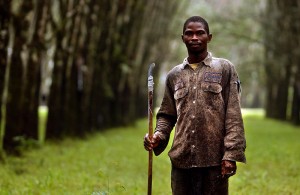World Rainforest Movement | May 2010
Monthly Bulletin - Issue 154 - May 2010
OUR VIEWPOINT
Africa is fast becoming the Promised Land for emerging powers –as in the cases of Brazil, China and India- trying to outcompete the old colonial powers in the scramble for the riches of this continent. At the same time other comparatively less powerful countries –such as Saudi Arabia, Qatar, Kuwait, South Korea, Finland and others- are grabbing whatever they can –farmland, forests, carbon markets, cheap labour- in the spaces left unoccupied by the former.
As peace expands over the until recently war-torn continent, national and foreign governments –from North and South- open up opportunities for access to Africa’s natural resources by transnational corporations. The key words being used to hide their true intentions –profits and plunder- are poverty alleviation, job creation, healthcare, education, development.
Within this context, the Liberian Sustainable Development Institute (SDI) hosted on 27-29 April in Monrovia a very timely “International Conference on Community Rights and Natural Resources”, organized jointly with the Africa Community Rights Network and the World Rainforest Movement.
The meeting brought together 35 community representatives from 9 Liberian counties, NGO delegates from 10 African countries (Cameroon, Central African Republic, Congo Brazzaville, Gabon, Ghana, Kenya, Liberia, Nigeria, Tanzania and Togo), as well as participants from Brazil, Costa Rica, Ecuador, Netherlands, United Kingdom and Uruguay.
The main issues addressed at the meeting related to natural resource extraction and community rights, focusing particularly on the forestry sector and including industrial logging, large-scale tree plantations and forest-related carbon markets (REDD).
In the case of Liberia, the host organization (SDI) had recently alerted that “there is convincing evidence that large-scale logging operations, contrary to widespread expectations, neither alleviate poverty nor create secure and decent jobs for forest communities. In fact these operations have been found to exacerbate poverty in forest communities, and in other instances they have played a direct role in financing state and non-state actors involved in violent conflicts.” (1)
In spite of the evidence, the Liberian government is opening up a third of the country’s forests –more than 1 million hectares- to industrial logging, which has raised strong concerns among forest communities that will be affected by those operations.
The situation was discussed at the Monrovia meeting and after a fruitful exchange of experiences, Liberian community representatives produced a statement (2) explaining that although “the new forestry reform law of Liberia provides for the consultation of local communities and their free and informed participation in the decision making processes of their forest resources … the processes leading to the signing of social agreements between the communities and concession holders did not take into account the informed participation of affected communities…” The statement added that “local communities have been repeatedly ignored about decisions relating to the use of their forest resources”, and that “contract holders and managers of forest resources have consistently failed to respect community rights and ensure fulfillment of community benefits…”
As a result, one of their main demands was “that all social agreements signed between affected communities and concession holders be renegotiated”.
On their part, the members of the Africa Community Rights Network (ACRN) also released a statement (3) calling for a number of urgent actions in the region’s countries, among which the following:
– That Community Rights (CR) should be the centre of natural resource governance and management.
– That government ensure CR Laws are made and where such law exist, fully implemented and the knowledge should be made accessible to the communities.– That governments ensure access to information on natural resources management to interested parties, particularly to affected communities.
– That community involvement should be based on free prior informed consent.– That governments ensure that women have equal rights and access as well as equal participation in natural resources management.
– That government ensures that fair prices should be paid for natural resources exploitation in Africa. The meeting also addressed the issue of large scale tree plantations –rubber, oil palm, eucalyptus- as well as that of the carbon market in general and REDD in particular, regarding their possible impacts on African local communities and on their rights. In this respects, the community statement demanded “that more and direct community consultations be held on emerging issues such as the Voluntary Partnership Agreement, REDD, carbon trading, and large-scale plantations”. On its part, the ACRN statement “noted the increasing amount of land being targeted for large scale monoculture plantation in Africa over the last few years” and expressed that “having noted the negative impacts of large scale plantations we call for vigilance in order to protect livelihood and environment.” At the same time, they “noted that carbon trading will provide a perfect excuse for northern and industrialized countries to escape their responsibility to drastically reduce their carbon emissions” and therefore rejected “carbon trading as means of financing sustainable forest management.” Both the community and ACRN statements show the abysmal differences between community and corporate approaches to natural resource extraction. While the former focuses on community rights, the latter thinks in terms of access to and appropriation of other people’s resources for profit-making. While the former can ensure long term benefits to forest communities, the latter results in increased poverty and resource destruction. While the former can conserve forests, the latter results in their degradation and substitution by monoculture tree plantations. In such context, the message coming from the Africa Community Rights Network is loud and clear: “Community Rights should be the centre of natural resource governance and management.” (1) Liberia – The Promise Betrayed, January 2010http://www.wrm.org.uy/countries/Liberia/Promise_Betrayed.pdf
(2) http://www.wrm.org.uy/countries/Liberia/Position_statement.html (3) http://www.wrm.org.uy/countries/Liberia/Africa_Community_Rights.html












